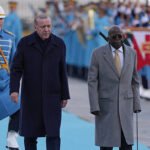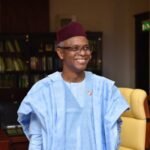
By Sylvester Udemezue
During my recent visit to Ghana as part of the Nigerian Law School delegation to the 2025 Annual General Conference of the African Bar Association (AfBA), I encountered a society where order, discipline, and basic human decency flow naturally into everyday life.
At the outset, I must express deep appreciation to the Director-General of the Nigerian Law School, Prof. Isa Hayatu Chiroma, SAN, Life Bencher, whose visionary leadership and unwavering commitment to academic excellence have continually opened global platforms for staff growth and professional development. His consistent encouragement of participation in international conferences such as AfBA reflects a rare dedication to human capital development within the Nigerian Law School.
Ordinary experiences on the streets of Accra revealed how much difference civic responsibility and social order can make in building a peaceful and functional community. What struck me most was not grand infrastructure or government projects, but the quiet civility of daily conduct: the small, consistent gestures that hold society together and make it feel organized, humane, and serene. The following are some of my personal observations and experiences in Accra: moments that, when pieced together, show how ordinary discipline can create extraordinary order.
1. *The Airport Taxi Encounter:* Upon arrival at the Kotoka International Airport, some of my colleagues and I (seven in number) met a taxi driver named Mr. Dominic. When we asked him to take us to a safe and affordable hotel, he smiled warmly and said, “Relax, you’re in Ghana, not in Nigeria where you could easily be kidnapped or robbed. You’re safe here.” We were speechless. That statement alone spoke volumes about our country’s global image. Meanwhile, his calm assurance, offered with such sincerity, set the tone for everything that followed. It was not just a welcome to a new country, but an introduction to a culture grounded in quiet confidence and civic decency.
2. *Public Trust:* For want of space, only three of us boarded Mr. Dominic’s taxi. On one occasion, he parked the vehicle and, without hesitation, left the ignition on and the doors unlocked as he stepped out to help us inspect a hotel. When we expressed concern, he simply smiled and said, “Nothing will happen. No one will touch it.” That quiet confidence in others (that unspoken faith in the honesty of strangers) was both humbling and profoundly moving.
3. *Commercial Buses: The _Trotro_ Experience:* In Ghana, the ubiquitous public buses are called trotros. They’re called _Danfo_ in Nigeria. One remarkable feature of these vehicles is that their doors remain closed while in motion. I moved through seven different parts of Accra and never once saw a trotro driving with its door open. The sense of order and safety appeared ingrained: an unspoken rule followed by all.
4. *The Conductor’s Permanent Seat:* Each trotro has a conductor with a specific seat inside the vehicle. Twice, I mistakenly sat in that space, only to be politely informed that it was reserved for the conductor. The conductor never stands or clings onto a permanently open door while the bus is in motion. This small arrangement spoke volumes about organization and respect for structure: everyone has a defined role, and everyone honors it.
5. *Traffic and Orderliness:* What impressed me most on Accra’s roads was the order. Vehicles moved smoothly, lanes were respected, and drivers obeyed traffic lights. I rarely saw uniformed traffic officers directing flow. It seemed as though obedience to traffic regulations was part of civic instinct rather than external enforcement.
6. *Absence of Harassment or Extortion:* Throughout my stay, I saw no touts or street agents harassing commercial drivers or collecting illegal levies. Public transport operated peacefully and professionally, free from interference. This created a sense of dignity around the transport system and respect between drivers and passengers alike.
7. *Respect for Pedestrians:* In Ghana, motorists demonstrate an admirable courtesy toward pedestrians. When someone steps onto the road, drivers slow down to let them pass. I found this habit of yielding to others (especially the vulnerable) both civil and humane. In Ghana, most motorists are careful so as to not harm people. It is the kind of respect that builds trust among citizens.
8. *Speed and Caution:* City driving in Accra is deliberate and measured. Drivers appear conscious of their responsibility to others; they maintain moderate speed on city roads. You can sense their deliberate efforts to avoid harm to others. The absence of reckless driving is not due to fear of punishment but a cultivated awareness that safety is everyone’s duty.
9. *Composure and Humanity in Public Transport:* Trotro drivers and their conductors maintain remarkable composure. They are calm, polite, patient, and approachable. Even when the bus fills up or delays occur, voices remain calm. Their quiet professionalism adds to the sense of collective peace that defines city life.
10. *Everyday Kindness and Patience:* One evening, I told the driver of a trotro I boarded that I wanted to buy roasted corn. Without hesitation, he stopped and waited patiently for me to buy. Later, when I asked for water, he instructed his conductor to get it for me, assuring me I could pay later with my fare. None of the passengers complained. That simple kindness, rooted in patience and shared humanity, left a lasting impression.
11. *Steady Electricity:* During my stay, power supply remained constant: not once did the lights flicker. When I inquired how often electricity goes off, someone replied, “Only when there is a fault.” Consistent infrastructure reflects consistent systems: and perhaps the discipline of maintaining them.
12. *Taxation and Documentation:* At our hotel, we received an official, government-printed receipt and were asked to complete an alien form for record purposes. This showed how structured and accountable Ghana’s civic administration is. It was clear that every guest, resident, and business operation is part of a functioning system that values documentation and responsibility.
13. *No Open Grazing:* Across all seven areas I visited, I never saw livestock wandering along city roads. The absence of open grazing was a quiet reflection of urban order: of clear boundaries between rural and civic life, and of respect for communal space.
14. *Round-the-Clock Transportation:* In Accra, apart from taxi cabs, some trotros run day and night. I personally confirmed this when I took a trip from Trade Fair to Osu around 1:00 a.m. The streets were calm, safe, and active. Continuous movement without chaos is possible only where there is public trust and low crime.
15. *A Moment of Comic Relief:* Once, we chartered a trotro from Osu to an area known as Palm Wine. Along the way, the driver stopped briefly to pick up a group of young ladies. When we protested, he laughed good-naturedly and said, “I just wanted to bring some fine ladies for you to toast.” Everyone burst into laughter, but we insisted he should drive since the trotro was on charter; he cheerfully continued the journey. Even humor in Ghana seemed clean and harmless, rooted in friendliness rather than mischief.
16. *Currency and Quality of Goods:* The Ghanaian Cedi is stable and respected. Besides, everyday items (from serviettes and handkerchiefs to shopping bags) are of good quality. Cleanliness in restaurants and public places is a visible norm. Even at the airport, there were no touts or unnecessary disorder. Everything worked with a quiet precision that reflected collective pride.
17. *A Stranger’s Kindness:* Once, outside Labadi Beach Hotel, I met a lady waiting for a trotro. When I asked for directions to an MTN office, she not only offered to guide me but volunteered to use her own ID to help me register a SIM card. Her generosity was genuine and spontaneous: the kind of kindness that comes naturally in a culture where humanity still matters.
18. *A Lesson in Integrity:* On our last night in Accra, the three of us dined at AllDay Food Court, Opposite Socca Bet at Palm Wine Area in Accra, but soon realized we had run short of Ghanaian Cedis. The manager, Joshua, without hesitation, allowed us to go, trusting that we would return the next morning to settle the bill. When a bystander cautioned him, saying, “Don’t trust Nigerians,” we reassured him that we would not disappoint.True to our word, early the next morning, we arranged and had 280 Cedis transferred to him via mobile money as early as 06:00AM. A few moments later, Joshua sent a message expressing deep gratitude and relief. He confessed that after we left their the previous night, his boss had made him pay the money from his own pocket, fearing we would never return. Our honesty, he said, had restored his faith in Nigerians. We are not sharing this story for self-praise, but to highlight a moral truth: *whatever you do abroad reflects on your country.* As the Nigerian proverb reminds us, *“The reputation of a village rests on the character of its people.”* Every action we take beyond our borders either polishes or tarnishes the collective image of our nation. In the words of the late diplomat and author, Kofi Annan, *“We may have different religions, different languages, different colored skin, but we all belong to one human race.”* It is by our conduct, by the quiet integrity we show when no one is watching, that we affirm this shared humanity and uplift our national identity. We must therefore always remember that to travel abroad is to carry the invisible flag of one’s country. As the saying goes, *”Wherever you go, you represent where you come from.”* Thus, being a good ambassador is not a title; it is a responsibility: one that demands honesty, humility, and respect. Our encounter with Joshua was a gentle reminder that integrity transcends borders, and that sometimes, a simple act of honour can speak louder for one’s country than a thousand speeches.
19. *Order and Comfort in Public Transport:* In Ghana’s Accra, the trotro (the popular commercial bus) carries only three passengers per row. That is, each row of seats behind the front is strictly limited to three occupants, ensuring that everyone sits comfortably without being cramped. This simple rule, diligently observed, promotes not only physical comfort but also respect for personal space and orderliness: values that make public transport in Accra remarkably more humane and efficient.
20. *Safety First: The Culture of Helmet Use in Accra:* In Accra, every commercial motorcycle rider wears a helmet: without exception. Across the seven areas I visited within the city, I did not encounter a single rider without one. This simple but powerful habit reflects a collective consciousness about safety and responsibility. Wearing a helmet is not seen as a burden or a regulation to evade, but as a personal commitment to preserving life. It is a quiet reminder that self-discipline begins with valuing one’s own safety.
21. *Homecoming:* When it was time to leave, I felt enriched and humbled. Ghana had welcomed me not only with its hospitality but with its quiet lessons in civic maturity. Now, that I’m back from Ghana, you may tell me “Akwaaba,” which means “welcome” in the Ghanaian language, but in this case, it should be *”Welcome back home”.* However, from the reflection above, it appears the word *”Akwaaba”* has taken on a deeper meaning: *an invitation to embrace the values that hold a society together.*
REFLECTIONS AND TAKEAWAYS
My days in Ghana reaffirmed that true national strength lies not only in laws or leadership, but in the discipline, decency, order, and empathy of everyday citizens. The calm obedience to simple rules, the culture of patience, the sense of collective respect: these are the invisible foundations of a humane society. Discipline, when lived daily, becomes culture. Order, when internalized, becomes peace. And humanity, when practiced quietly, becomes a nation’s soul. We must learn to take personal responsibility in how we drive, speak, lead, serve, and treat one another, etc. Change begins not in government houses, but in the hearts of ordinary citizens.
Akwaaba!
May this reflection inspire in us a renewed sense of duty—to build communities where respect, decency, and civic responsibility are not exceptions but everyday habits.
May I once again express my profound gratitude to the visionary Director-General of the Nigerian Law School, Prof. Isa Hayatu Chiroma, SAN, Life Bencher, whose exemplary leadership, foresight, and unwavering commitment to academic excellence, professional development, and global engagement continue to advance the School’s visibility and inspire its staff toward broader intellectual and civic exposure. But for his sagacity and support, I would not have enjoyed this enriching experience nor had the opportunity to witness firsthand, from a neighbouring country, how civic order and moral discipline can sustain a peaceful and progressive nation.
Respectfully,
Sylvester Udemezue (udems).
08021365545.
lawmentorng@gmail.com.
(26 October 2025).









